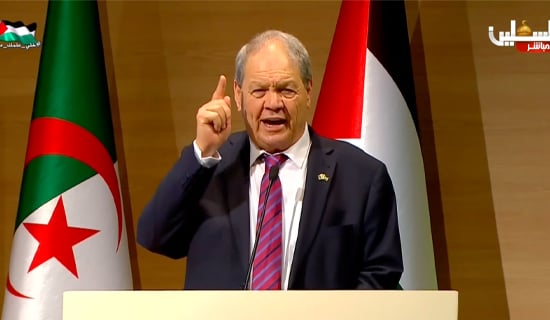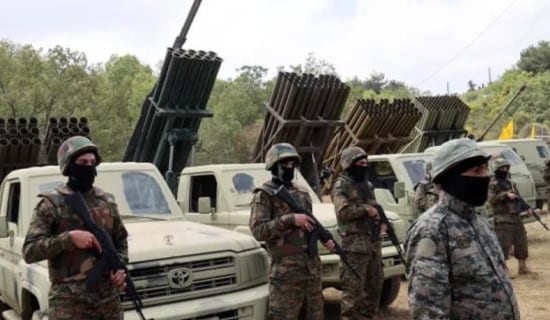The terrorist attacks of 9/11 have brought to the head of the Arab agenda issues that the Arab regimes have tried for years to suppress. Like the issue of Islamic terrorism, which forced the Arab regimes to deal with all aspects connected to it (such as extremist religious education and incitement in the mosques and in the media), the issue of internal reform is also now at the forefront of public debate in Arab countries.
In its war against terrorism, the U.S. regards the democratization of the Arab world, the promotion of human rights, and the development of civil society as central aims. The Greater Middle East Initiative, announced by U.S. President George Bush in June 2004, has taken shape accordingly. This initiative, along with the war in Iraq – which aims, among other things, to establish a modern democratic regime as a model for other Arab countries – prevented the Arab regimes from continuing to ignore the demands for reform. At the same time, demands for reform have increasingly come from within the Arab societies themselves.
Since reform became a priority on the public agenda, debate on the issue in the Arab media has intensified. At first, most public opinion shapers and leaders rejected the external initiatives, claiming that they constituted intervention in the internal affairs of sovereign states. However, with the growth both of external pressure and of internal calls for reform, real changes began to emerge. Thus, for example, municipal elections were held in Saudi Arabia for the first time, in February 2005. [1] The Kuwaiti parliament, in May 2005, approved a bill enabling women to participate in elections, both as voters and as candidates. [2] In Lebanon, mass demonstrations following the assassination of former Lebanese prime minister Rafiq Al-Hariri led to Syria 's withdrawal from Lebanon, and a new government was established following elections that were democratic in nature, held in May 2005. In Egypt, presidential elections were held for the first time with multiple candidates in September 2005. [3]
The debate on reform is reflected in the cartoons appearing in the Arab media. The number of cartoons dealing with reform is constantly on the rise, and the range of issues they deal with is steadily expanding. These cartoons deal, for example, with the progress made in reform, and also with the tyranny of the regimes, with democracy, with elections, and with freedom of speech.
The following are a number of examples of cartoons on internal reform that have appeared in the Arab media.
The State of Reform in the Arab World
Cartoon No. 1: A tortoise with a "reform" note in its mouth carries on its back an official of the regime, who tells a man with a ball and chain and a booklet on reform: "You see that the governments are ahead of the people on reforms!"
 From Al-Dustour (Jordan), June 18, 2005. [4]
From Al-Dustour (Jordan), June 18, 2005. [4]
Cartoon No. 2: "Arab reality" in the form of a man falling onto another man, who is holding a sign that reads "Yes to reform"
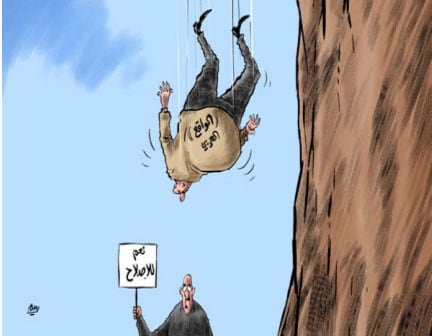 From Al-Sharq Al-Awsat (London), March 10, 2004. [5]
From Al-Sharq Al-Awsat (London), March 10, 2004. [5]
Cartoon No. 3: The apples that the Arab picks from the "tree of reform" are the rotten, worm-riddled apples of "discrimination," "corruption," "high cost of living." "taxes," "price increases," and "favoritism." He leaves on the tree the healthy fruits of "justice,", "experience," "proficiency," "equality," "transparency," and "implementation of the law"
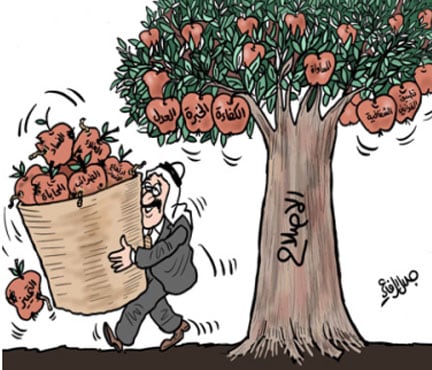 From Al-Dustour (Jordan), July 5, 2005. [6]
From Al-Dustour (Jordan), July 5, 2005. [6]
Cartoon No. 4: "Corruption" takes the form of a bestial demon, which is using a pure white cloth symbolizing "reforms" to wipe clean the bloodstained knife with which it murdered "development" in the form of a young woman
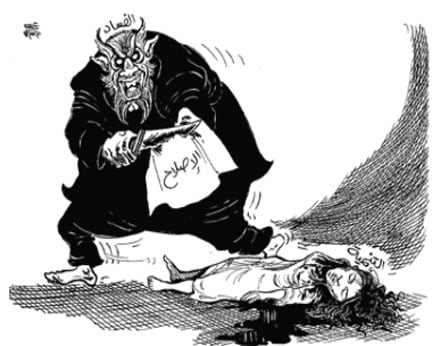 From Al-Sharq (Qatar), February 10, 2005. [7]
From Al-Sharq (Qatar), February 10, 2005. [7]
Cartoon No. 5: "The current Arab reality": A reformist demonstration is confined in a bottle by the "Absolute Power." The signs carried by the demonstrators say "Reform!", "Free the Arabs!", "No to inherited government," and "Enough!" [kifaya]
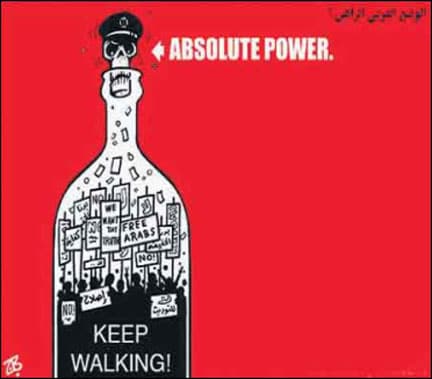 From Al-Yawm (Saudi Arabia), September 19, 2005. [8]
From Al-Yawm (Saudi Arabia), September 19, 2005. [8]
Cartoon No. 6: An Arab holding a sword labeled "freedom of the press" seeks to behead a hydra representing "mismanagement."
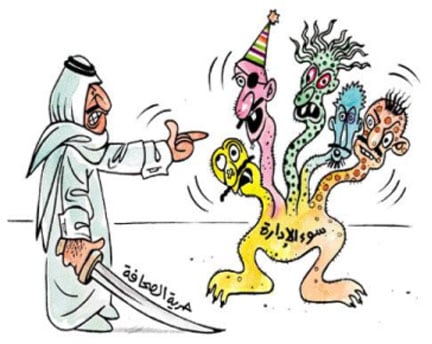 From Al-Watan (Qatar), April 26, 2005. [9]
From Al-Watan (Qatar), April 26, 2005. [9]
Tyranny and Democracy
Cartoon No. 7: An Arab being roasted on the fire of "tyranny," while the "regimes" sit and watch
 From the liberal website Elaph, March 31, 2005. [10]
From the liberal website Elaph, March 31, 2005. [10]
Cartoon No. 8: An Arab holding a document saying: "Democracy 0/10; corruption 10/10"
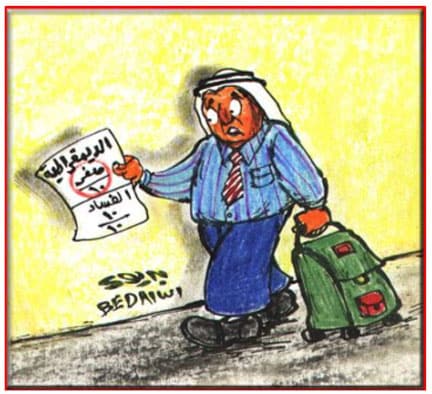 From the liberal website Elaph, March 9, 2005. [11]
From the liberal website Elaph, March 9, 2005. [11]
Cartoon No. 9: The U.S. offers a chair representing "the Arab world" to "democracy" in the form of a fat woman.
 From Al-Sharq Al-Awsat (London), February 2, 2005. [12]
From Al-Sharq Al-Awsat (London), February 2, 2005. [12]
Cartoon No. 10: "Wanted: democracy"
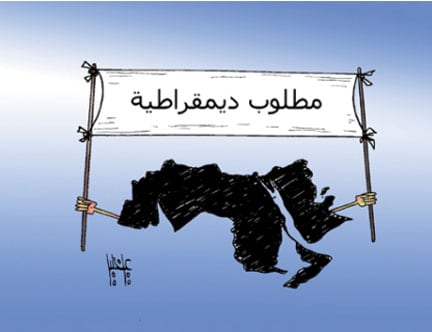 From Al-Wasat News (Bahrain), August 16, 2005 [13]
From Al-Wasat News (Bahrain), August 16, 2005 [13]
Cartoon No. 11: On the right, "Elections in the West"; on the left, "The Arabs' Elections"
 From Al-Sharq Al-Awsat (London), November 4, 2004. [14]
From Al-Sharq Al-Awsat (London), November 4, 2004. [14]
Cartoon No. 12: Citizens try to climb into the seat of "elections"
 From Al-Khaleej (UAE), September 7, 2005. [15]
From Al-Khaleej (UAE), September 7, 2005. [15]
Cartoon No. 13: The speaker, described as "a ruler who has been in power for 50 years," says to the crowd: "Believe me, the devil you know is better than the devil you don't."
 From Akhbar Al-Khaleej (Bahrain), September 12, 2005. [16]
From Akhbar Al-Khaleej (Bahrain), September 12, 2005. [16]
Cartoon No. 14: The cannon of "elections in Egypt" shoots at the "political deadlock."
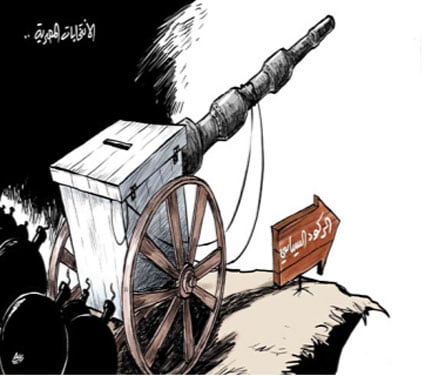 From Al-Sharq Al-Awsat (London), September 8, 2005. [17]
From Al-Sharq Al-Awsat (London), September 8, 2005. [17]
Cartoon No. 15: The sign overhead reads "Democracy Road, this way only." The sign by the road says "no turning back"
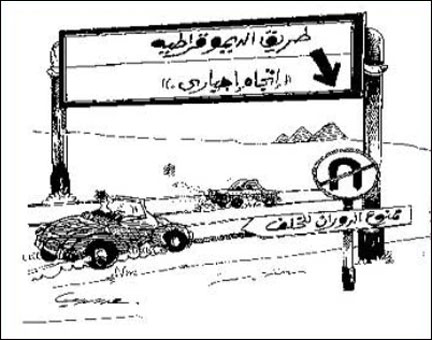 From Al-Ahram (Egypt), September 11, 2005. [18]
From Al-Ahram (Egypt), September 11, 2005. [18]
Cartoon No. 16: On the occasion of the Egyptian presidential elections: "Stand up, Egyptian, Egypt is always calling you."
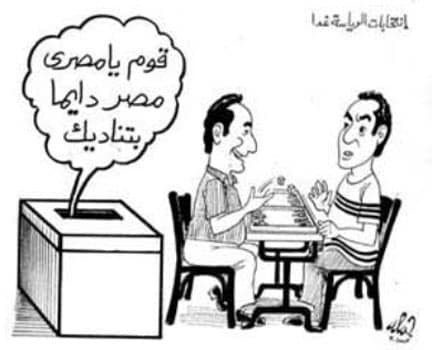 From Al-Ahram (Egypt), September 6, 2005. [19]
From Al-Ahram (Egypt), September 6, 2005. [19]
Cartoon No. 17: A woman representing Egypt holds up the beacon of "democracy"
 From Al-Ahram (Egypt), September 7, 2005. [20]
From Al-Ahram (Egypt), September 7, 2005. [20]
Cartoon No. 18: An Egyptian voter whose finger has been marked with ink to show that he has already voted: "Mother, you should be proud. Yesterday, your sonsingle-handedly determined who will continue to be the president of our republic."
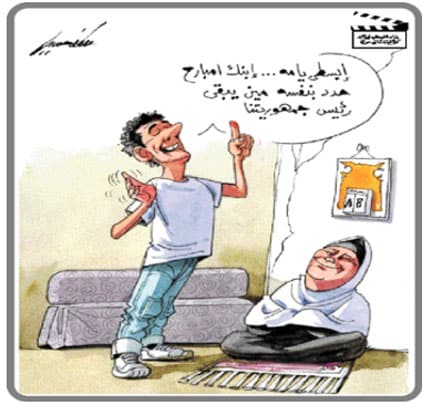 From Al-Akhbar ( Egypt ), September 10, 2005. [21]
From Al-Akhbar ( Egypt ), September 10, 2005. [21]
Cartoon No. 19: "Presidential elections"
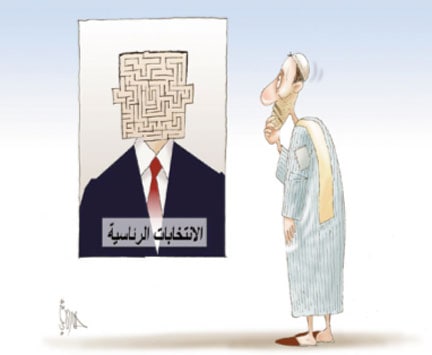 From Al-Ayyam (Bahrain), September 9, 2005. [22]
From Al-Ayyam (Bahrain), September 9, 2005. [22]
Cartoon No. 20: "Elections in Afghanistan"
 From Al-Yawm (Saudi Arabia), September 19, 2005. [23]
From Al-Yawm (Saudi Arabia), September 19, 2005. [23]
*A. Dankowitz is Director of MEMRI's Reform Project
Endnotes:
[1] For the municipal elections in Saudi Arabia, see MEMRI I&A 206:
A Saudi Public Debate on Women's Participation in the Municipal Elections.
[2] For the law enabling Kuwaiti women to participate in elections, see MEMRI I&A 228:
The Public Debate on the New Amendment Granting Kuwaiti Women Political Rights.
[3] For the change in the electoral system, see MEMRI I&A 237:
[4] http://www.addustour.com/cartoons/big_cart.asp?img=14737_1.jpg&auth=18/6/2005
[5] http://www.aawsat.com/sections.asp?section=27&issue=9234
[6] http://www.addustour.com/cartoons/big_cart.asp?img=14754_1.jpg&auth=5/7/2005
[7] http://www.al-sharq.com/site/topics/static.asp?cu_no=1&lng=0&template_id=273&temp_type=42&parent_id=271
[8] http://www.alyaum.com/issue/page.php?IN=11784&P=13
[9] http://www.al-watan.com/data/20050426/index.asp?page=cartoon.htm
[10] http://www.elaph.com/Elaphcartoons
[11] http://www.elaph.com/ElaphCartoons/CartoonDetails?imageid=46422
[12] http://www.asharqalawsat.com/sections.asp?section=27&issue=9563
[13] http://www.alwasatnews.com/section.asp?cID=20&mydate=8-16-2005&old=0
[14] http://www.asharqalawsat.com/sections.asp?section=27&issue=9473
[15] http://www.alkhaleej.ae/articles/show_article.cfm?val=195322
[16] http://www.akhbar-alkhaleej.com/cartoons.asp?Sn=CART
[17] http://www.asharqalawsat.com/sections.asp?section=27&issue=9781
[18] http://www.ahram.org.eg/archive/Index.asp?CurFN=catr2.htm&DID=8606
[19] http://www.ahram.org.eg/Index.asp?CurFN=catr2.htm&DID=8601
[20] http://www.ahram.org.eg/Index.asp?CurFN=catr2.htm&DID=8602
[21] http://www.elakhbar.org.eg/issues/16657/1300.html


